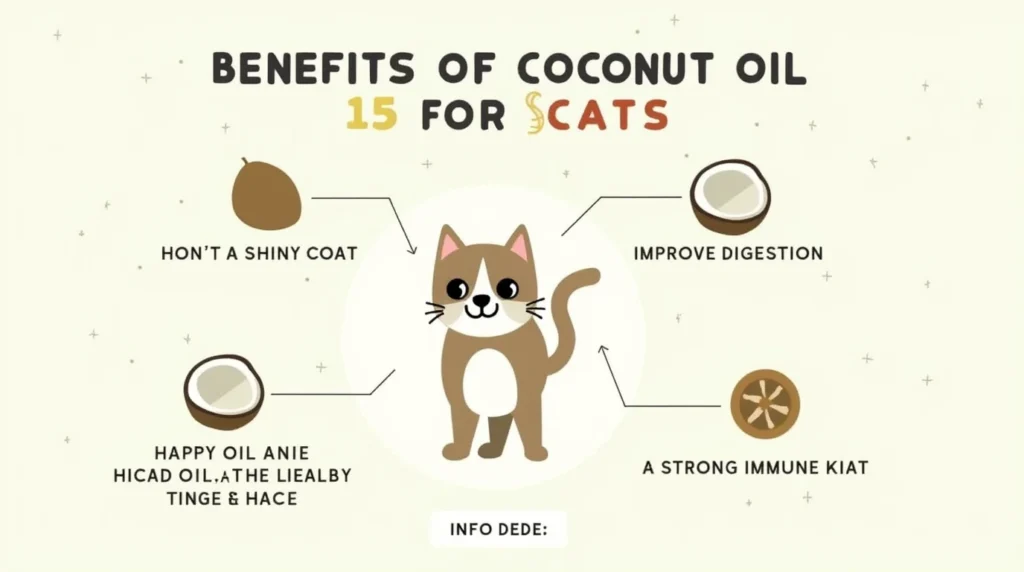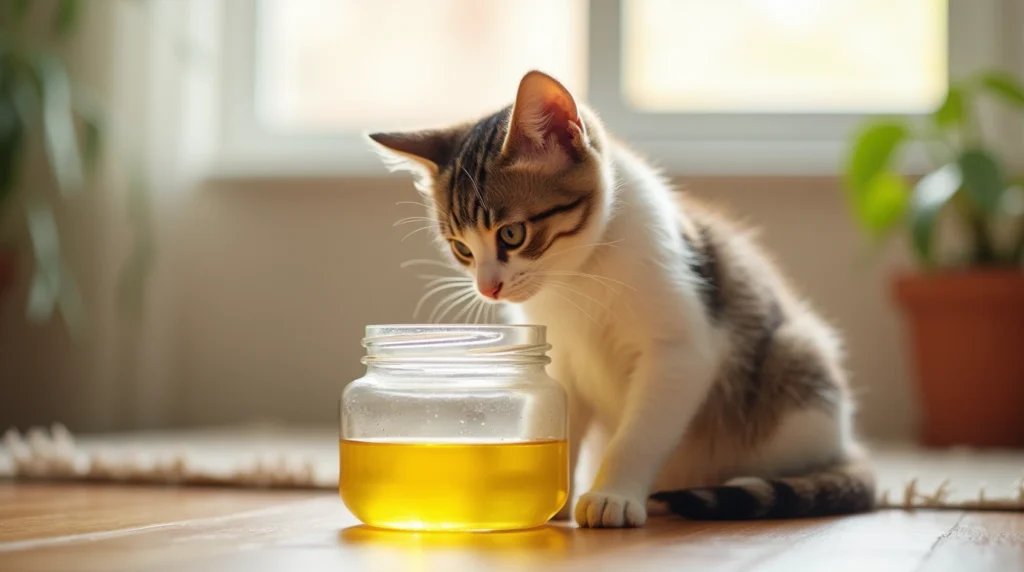Table of Contents
As a cat owner, you might have wondered if your furry friend can benefit from coconut oil. Many pet owners are curious about using this natural product for their cat’s skin and overall health. Coconut oil has gained popularity for its potential benefits, but it’s important to approach its use with care.
This guide offers a comprehensive review of the benefits and risks of using coconut oil for cats. We’ll explore both topical and dietary applications, highlighting expert recommendations from veterinarians. While small amounts can be safe and even beneficial, larger doses may lead to adverse effects.
Understanding proper dosage and safety concerns is crucial. In the following sections, we’ll delve into the details to ensure you make informed decisions for your cat’s well-being.

Key Takeaways
- Coconut oil can be used topically and in small oral doses for cats.
- Always consult a veterinarian before introducing coconut oil to your cat’s routine.
- Excessive consumption of coconut oil can lead to health issues in cats.
- Proper dosage and moderation are key to safe usage.
- This guide provides detailed insights into the safe use of coconut oil for cats.
Exploring the Benefits of Coconut Oil for Your Cat
Coconut oil has become a popular natural remedy for cats, offering several potential health benefits. Many cat owners are now considering it as a way to improve their pet’s skin, digestion, and overall well-being.
Improving Skin and Coat Health
Coconut oil is rich in lauric acid, a compound known for its antimicrobial properties. Applying it directly to your cat’s skin can help moisturize dry areas and improve coat shine. For example, if your cat has dry patches or dull fur, coconut oil can make their coat softer and more vibrant. It’s also gentle enough for sensitive skin, making it a great natural solution for cats with skin allergies or irritation.
Enhancing Digestion and Energy Levels
Medium-chain triglycerides (MCTs) in coconut oil are easily absorbed by your cat’s body, providing a quick energy source. This can be especially beneficial for cats with digestive issues, as MCTs are less likely to cause upset. Improved digestion can lead to better overall health and more energetic playtime for your pet.
Supporting Immune Function
Regular, moderate use of coconut oil may help boost your cat’s immune system. The lauric acid in coconut oil has been shown to have antiviral and antibacterial properties, which can help your cat fight off infections and stay healthier overall.
| Benefit | Details |
|---|---|
| Skin Health | Moisturizes dry skin, improves coat shine, and soothes irritation. |
| Digestion | Supports healthy digestion and provides a quick energy source. |
| Immune Function | Contains antimicrobial properties that help fight infections. |
By incorporating coconut oil into your cat’s care routine, you can help improve their skin health, digestion, and immune function. Always consult your veterinarian before making any changes to ensure it’s the best choice for your pet.
Recognizing the Risks and Side Effects
While coconut oil can offer benefits for your pet, it’s important to be aware of the potential risks. Like any supplement, using too much can lead to issues.
Digestive Upset and Weight Gain
Feeding your pet too much coconut oil can cause stomach upset. Diarrhea is a common issue when the dosage is too high. The calories from coconut oil can also lead to weight gain if not monitored. This is especially true for pets with food sensitivities or those who are less active.
Topical Reactions and Greasy Coats
Using coconut oil on your pet’s skin might cause a greasy coat or mild irritation. Some pets may develop redness or itching. Always do a patch test and watch for any signs of discomfort.
| Risk | Details |
|---|---|
| Digestive Issues | High doses may cause diarrhea or stomach discomfort. |
| Weight Gain | Excessive calorie intake can lead to unwanted weight gain. |
| Greasy Coat | Topical use might result in a greasy texture or minor skin irritation. |
It’s crucial to use coconut oil in moderation and consult your vet before adding it to your pet’s routine. Monitoring your pet’s reaction will help ensure their safety and well-being.
Understanding Coconut Oil’s Nutritional Components
Coconut oil is more than just a trendy supplement; it’s packed with unique nutritional elements that make it beneficial for your cat’s health. Understanding these components can help you make informed decisions about its use.
Lauric Acid and Its Antimicrobial Properties
Lauric acid, a key component of coconut oil, is renowned for its strong antimicrobial properties. It effectively combats bacteria, viruses, and fungi, making it a natural defense booster for your cat. This compound not only supports immune function but also contributes to a healthier, shinier coat.
Medium-Chain Triglycerides Explained
Coconut oil is rich in medium-chain triglycerides (MCTs), which are easily absorbed and quickly converted into energy. Unlike other fats, MCTs are less likely to cause digestive stress, making them an excellent option for cats with sensitive stomachs. They also promote better nutrient absorption, ensuring your cat gets the most out of their diet.
| Nutritional Component | Benefit |
|---|---|
| Lauric Acid | Antimicrobial properties support immune health and skin vitality. |
| MCTs | Provide quick energy and aid in digestion without stressing the liver. |
| Overall Health | Contributes to a shiny coat and overall well-being. |
While coconut oil offers these health benefits, moderation is key. Always consult your veterinarian to ensure safe and effective use for your cat.
How to Safely Introduce Coconut Oil to Your Cat
Introducing coconut oil to your cat’s routine can be beneficial when done correctly. Start with small amounts to ensure your cat tolerates it well. Always consult your veterinarian before making any changes.
Topical Application Guidelines
For skin issues, apply a tiny amount of coconut oil directly to the affected area. Gently massage it in. This helps with dry patches and skin allergies.
Start with a small test area to check for any signs of irritation. If your cat reacts well, you can gradually use it on other areas.
Oral Consumption and Dosage Tips
Begin with a small oral dose of about 1/8 teaspoon per day. You can mix it with their food for easy digestion. Monitor your cat’s reaction closely.
If your cat handles the initial dose well, you can slowly increase it, but always consult your vet first. Excessive amounts can lead to digestive issues like diarrhea.
| Application Method | Guidelines |
|---|---|
| Topical Use | Apply a small amount to affected skin areas. Test a small patch first. |
| Oral Consumption | Start with 1/8 teaspoon daily, mixed with food. Monitor for digestive issues. |
Always watch for signs of discomfort or digestive upset. If you notice any issues, stop use and consult your vet immediately. Proper introduction ensures your cat’s safety and well-being.
can cats eat coconut oil? Evaluating Dosage and Administration
When considering whether your cat can benefit from coconut oil, it’s essential to focus on the right dosage and administration. While coconut oil offers several benefits, improper use can lead to health issues. Understanding how to measure and administer it safely ensures your cat reaps the rewards without risks.
Determining the Right Amount
The correct dosage of coconut oil for your cat depends on their weight and dietary needs. Start with a small amount, such as 1/8 teaspoon per day, and mix it with their food. This approach helps prevent digestive upset and allows your cat to adjust gradually. Always consult your veterinarian to tailor the dosage to your cat’s specific health conditions.
Monitoring Your Cat’s Response
After introducing coconut oil, watch your cat closely for any changes. Signs of discomfort may include diarrhea, lethargy, or skin irritation. If you notice these symptoms, stop use immediately and seek veterinary advice. Remember, even beneficial substances can cause issues if overused.
- Begin with 1/8 teaspoon daily for small cats.
- Gradually increase dosage under veterinary guidance.
- Monitor for digestive issues or skin reactions.
- Consult your vet regularly to ensure safe use.
| Dosage Guidelines | Details |
|---|---|
| Starting Amount | 1/8 teaspoon per day for small cats. |
| Administration | Mix with food for easy digestion. |
| Monitoring | Watch for diarrhea or lethargy. |
Coconut oil can be a valuable addition to your cat’s care when used correctly. Always prioritize moderation and professional veterinary advice to ensure your cat’s health and safety.
Managing Common Health Issues with Coconut Oil
Coconut oil offers natural solutions for common cat health issues, making it a valuable addition to your pet care routine. Whether your cat suffers from dry skin or frequent hairballs, coconut oil provides benefits that can alleviate these concerns.
Alleviating Dry Skin and Allergies
Coconut oil is a natural moisturizer that can soothe dry, irritated skin. Its antimicrobial and anti-inflammatory properties help combat skin allergies, promoting healthier skin and a shinier coat. For best results, use therapeutic-grade coconut oil and apply it directly to affected areas after consulting your veterinarian.
| Benefit | Details |
|---|---|
| Moisturizing | Soothes dry skin and reduces irritation. |
| Anti-inflammatory | Reduces redness and swelling. |
| Antimicrobial | Fights bacteria and infections. |
Addressing Hairball Concerns
Coconut oil can help reduce hairballs by improving digestion and decreasing shedding. The medium-chain triglycerides (MCTs) in coconut oil are easily absorbed, providing energy and smoothing the digestive process. This can lead to less shedding and fewer hairballs.
| Benefit | Details |
|---|---|
| Digestion | Improves digestive health, reducing hairball formation. |
| Shedding | Decreases shedding, minimizing hairballs. |
| Energy | Provides a quick energy source for your cat. |

By using coconut oil thoughtfully, you can help your cat feel more comfortable and reduce common health issues. Always observe your cat’s response and adjust as needed to ensure their well-being.
Coconut Oil’s Role in Cat Diet and Digestion
Coconut oil plays a significant role in supporting your cat’s diet and digestion. Its unique nutritional profile makes it a valuable addition to your pet’s meals when used correctly. By understanding how it works, you can make informed decisions about incorporating it into your cat’s routine.
promoting nutrient absorption
Coconut oil is rich in medium-chain triglycerides (MCTs), which are easily absorbed by your cat’s body. These MCTs can enhance nutrient uptake, ensuring your cat gets the most out of their diet. This makes coconut oil a great source of energy and a support for overall digestive health.
| Benefit | Details |
|---|---|
| Nutrient Absorption | MCTs improve the uptake of essential nutrients. |
| Energy Source | Provides a quick and efficient energy supply. |
| Digestive Health | Supports a healthy digestive system. |
enhancing gut health and energy levels
The MCTs in coconut oil are not only easily absorbed but also serve as a readily available energy source. This can lead to improved gut health and more energetic playtime for your cat. A healthy gut also contributes to a shinier coat and better overall well-being.
| Benefit | Details |
|---|---|
| Gut Health | Supports a balanced digestive system. |
| Energy Levels | Provides a quick energy source. |
| Coat Health | Leads to a shinier and healthier coat. |
Exploring Alternatives and Complementary Supplements
If you’re considering supplements for your cat, it’s worth exploring options beyond coconut oil. While coconut oil offers unique benefits, other supplements can complement its effects or provide additional advantages.
Fish Oil and Omega-3 Options
Fish oil is a popular supplement rich in omega-3 fatty acids, particularly EPA and DHA. These nutrients are known for supporting joint health, reducing inflammation, and promoting skin vitality. Unlike coconut oil, which is high in medium-chain triglycerides (MCTs), fish oil contains long-chain fatty acids, making it a great complement to your cat’s diet.
Omega-3 supplements can enhance joint mobility and heart health, which may be particularly beneficial for older cats. When combined with coconut oil, these supplements can create a balanced approach to your cat’s wellness.
Other Natural Supplements
Beyond fish oil, other natural supplements like flaxseed oil and hemp oil offer additional benefits. Flaxseed oil is another source of omega-3s, while hemp oil provides essential fatty acids and antioxidants. These products can work alongside coconut oil to support overall health and digestion.
| Supplement | Key Benefits |
|---|---|
| Fish Oil | Supports joint health and reduces inflammation. |
| Flaxseed Oil | Provides omega-3 fatty acids for skin and heart health. |
| Hemp Oil | Offers essential fatty acids and antioxidants. |
When considering supplements, it’s important to evaluate their nutrient profiles and properties. Medium-chain triglycerides in coconut oil are easily absorbed, while the long-chain fatty acids in fish oil provide sustained benefits. This combination can enhance nutrient absorption and support your cat’s overall well-being.
- Consult your veterinarian before adding any new supplements.
- Consider multi-supplement regimens for comprehensive health benefits.
- Monitor your cat’s response to any new additions to their diet.

Always discuss any supplement changes with your veterinarian to ensure a balanced and safe diet for your cat.
Conclusion
Coconut oil can be a safe and beneficial addition to your cat’s care routine when used correctly. It offers antimicrobial properties and nutritional benefits that can enhance skin health and digestion. However, it’s important to use it in moderation to avoid issues like weight gain or digestive upset.
Every cat is different, so monitoring your pet’s response is crucial. Start with small amounts and consult your veterinarian for personalized advice. This ensures you can enjoy the benefits while keeping your cat safe and healthy.
In conclusion, coconut oil is a viable option for supporting your cat’s well-being. By following the guidelines and consulting with experts, you can make informed decisions that benefit your pet. Remember, it’s just one of many options available, so explore and choose what’s best for your cat with care.
FAQ
Is coconut oil safe for cats to consume?
Coconut oil can be safe for cats in small amounts when introduced properly. It contains medium-chain triglycerides (MCTs), which are easily digestible. However, always consult your veterinarian before adding it to your cat’s diet to ensure it’s appropriate for their specific health needs.
What are the health benefits of coconut oil for cats?
Coconut oil may support skin and coat health, improve digestion, and provide a source of energy due to its MCT content. It also contains lauric acid, which has antimicrobial properties that could help with minor skin issues.
How do I apply coconut oil to my cat’s skin?
For topical use, apply a small amount of melted coconut oil directly to your cat’s skin. Focus on areas with dryness or irritation. Avoid over-application, as it may leave a greasy residue on their coat.
Can coconut oil help with my cat’s digestion?
Yes, coconut oil may aid digestion due to its MCTs, which are easily absorbed by the body. However, start with a very small amount to prevent digestive upset, such as diarrhea or stomach discomfort.
Is coconut oil a good option for weight gain in cats?
Coconut oil is calorie-dense, so it may contribute to weight gain if overfed. Use it sparingly and only under veterinary guidance to avoid obesity-related health issues.
How much coconut oil should I give my cat?
The right amount varies by your cat’s size, weight, and health. Start with a tiny amount (about 1/8 teaspoon per 10 pounds of body weight) and monitor their response. Always consult your veterinarian for personalized advice.
Can coconut oil help with hairballs in cats?
Some cat owners report that small amounts of coconut oil may help reduce hairballs by improving digestion and lubricating the digestive tract. However, this is anecdotal and not scientifically proven.
What are the risks of using coconut oil for cats?
Overconsumption can lead to digestive issues, weight gain, or an imbalanced diet. Always use high-quality, pure coconut oil and avoid adding it to your cat’s food regularly without veterinary approval.
Can I use coconut oil as a substitute for my cat’s regular food?
No, coconut oil should not replace your cat’s balanced diet. It is a supplement and does not provide all the nutrients your cat needs for optimal health.
How do I know if my cat is reacting poorly to coconut oil?
Watch for signs of digestive upset, such as vomiting, diarrhea, or lethargy. If you notice any adverse reactions, discontinue use and consult your veterinarian immediately.
Are there alternatives to coconut oil for my cat’s health?
Yes, options like fish oil (rich in omega-3 fatty acids) or other natural supplements may also support your cat’s health. Discuss these alternatives with your veterinarian to find the best fit for your cat.
When should I avoid using coconut oil on my cat?
Avoid using coconut oil if your cat has a history of digestive issues, pancreatitis, or obesity. Always prioritize your veterinarian’s advice based on your cat’s specific health conditions.








One Comment
Comments are closed.